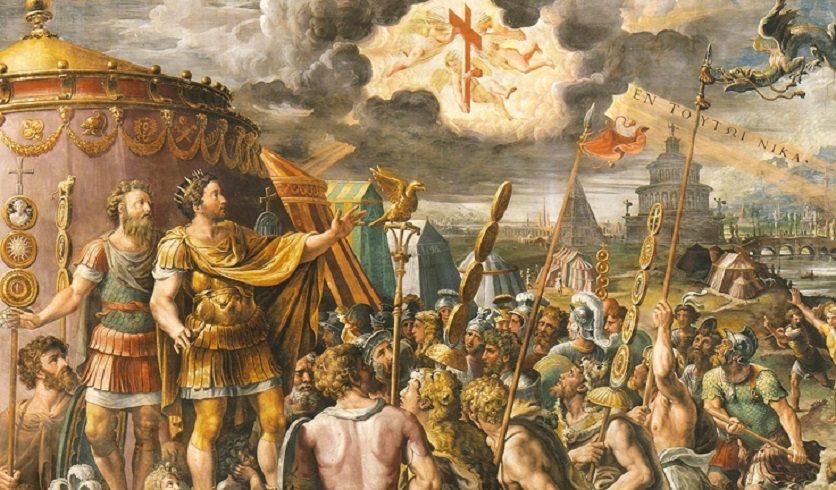The persecution of Christians has a long history, starting in 64 AD until the fourth century, ending with the Edict of Milan in 313 AD. With the advent and spread of the new religion across the Roman Empire, the persecution against Christians has also emerged.
Christians were considered worshipers of a pagan, foreign god – as they refused making a sacrifice to the Roman gods and outside the society. Nero was the first and one of the most cruel persecutors – he was the emperor who set Rome on fire, blaming the Christians, who were immediately declared as enemies of the human race, threatening the life of the people, of the emperor and the Roman state.
The martyrs of this period who remained in the memory of humanity were Saints Peter and Paul.
After a short period of peace between Christians and worshipers of the ancient gods, the persecution of Christians returns in 90, with the coming to the throne of Domitian (Domitianus). The emperor Domitian, in order to help the public treasury of the Empire, imposed the paying of a Jewish Tax for Jews and Christians – who are guided by the Old Testament.
But the Christians refuse to pay this unfair tax, giving the emperor an impetus to start the persecution. Upper class Christians were exiled, and the ordinary Christians (the mass of the population) were barbarously tortured and executed.
This time, what was the crime the Christians were found guilty for, the crime of which they were accused? Atheism – because, as mentioned before, they refused to worship the pagan gods of the Empire. The martyrs –such as St. John the Evangelist – were subjected to horrific torture, then exiled or executed by crucifixion or burning at the stake.
After another short period of peace, the persecution of Christians starts again, under Emperor Trajan, from 98 AD until 117 AD. Christians refusing to deny (renounce) their faith and worship Roman gods had to be tortured and killed. The martyrs of this period who remained in the memory of humanity were St. Simon – who was crucified and St. Ignatius of Antioch – who was devoured by lions.
Until 161 – when Marcus Aurelius came to power, the persecution of Christians presented only a few isolated cases. However, during his reign, noble Christians were exiled, as before, and low social, administrative, or political rank Christians were killed.
The persecution of Christians also continues under the reign of Septimius Severus, from 202 until 211, during which numerous martyrs were horribly murdered: they were thrown to the lions, leopards or bears. Especially new Christians (new converts to Christianity) have suffered, but the old Christians were relatively tolerated. After another short period of peace and tranquility, Maximinus Thrax, since 235, brutally attacked the entire Christian community.
Then, the persecution of Christians stopped for a while, especially with the reign of Philip the Arab, from 244 until 249, the first Christian emperor of the Roman Empire. But peace didn’t last long: in 249, Emperor Decius starts the persecution of all Christians again, as they didn’t want to renounce their faith and embrace the official religion.
There was other persecution under the reign of Valerianus, in 257, in order to steal the riches and wealth of Christians, and also the Church riches and properties. The rule of this emperor only lasted a year, and his son, Galilenus, came to the throne. He gave an imperial edict regarding tolerance toward Christians (Edict of Toleration), returning them the confiscated possessions and properties.
Persecution of Christians experienced a sad flourish under the Emperor Diocletian (from 284 to 305). Diocletian commanded churches to be destroyed, burned all the Christian books and denied Christians their right to perform public functions in the Roman Empire.
It became a crime punishable by death to refuse to worship the pagan gods and lower class Christians were enslaved. This persecution continues with Galerius; he ordered mass murder of all Christians – regardless of their social condition – and the burning of Holy See archives. Towards the end of his life, seriously ill, this cruel emperor gave an Edict of Toleration.
The persecution of Christians ended with the rule of Emperor Constantine the Great, who in 312 issued an edict of toleration for Christianity. The following year, this edict becomes an Edict of freedom of Christian worship. Constantine was perhaps the most important political figure who came to the aid of the new religion: after he came to power he immediately prohibited any persecution of Christians, also imposing the restitution of their previously seized (confiscated) properties and wealth. Constantine supported the church and subsidized it from public funds, granting privileges to the clergy.
In 312, Constantine the Great converted to Christianity, giving up the worship of pagan gods and in 337 – when his health began to deteriorate – he was baptized. But Constantine the Great considered himself a servant of God even before his conversion to Christianity.
Why so much hatred and perseverance in the persecution of Christians? First of all, Christians were seen as a threat to the official state religion. Secondly, because of the general human fear towards all was new, different and unknown.
Christians, being forced to secretly hold their religious services, were becoming, in the imagination of the masses, worshipers of a gruesome god, to whom they offered babies as a sacrifice, drinking their blood and eating their flesh.
Macabre images, flourished in the human mind captivated by the secret of the Christians – who didn’t reveal to strangers – as a precaution – what Holy Eucharist means (what the bread and the wine symbolize).
Another cause of hatred toward Christians was their stubborn refusal of worshiping or accepting the reality of pagan gods – gods of the Empire. This refusal and reluctance was challenging the Romans, with their attitude of superiority. And thus, Christians were ending up getting accused of atheism. Romans accused Christians of being atheists.
In addition, the fact that, for the Romans, Christians and Jews were two sects of the same religion (there was no distinction between the two religions) made the hatred against Jews to be propagated against Christians as well.
But the persecution of Christians only strengthened the religion in the collective consciousness: a religion that is worth to willingly die for; a religion that imposed respect and curiosity.
Christians (Christianity) became increasingly widespread throughout the Roman Empire, even during the mentioned persecutions. In the 3rd century, the Christians spread outside the Empire.
The precepts of the new religion: kindness, faith, humility, spiritual wealth, generosity and sacrifice, slowly won the hearts and minds of the population. But perhaps this would never have happened if Christianity wouldn’t have been so challenged and persecuted. But the force with which some martyrs raised and stood over the persecution impressed the collective mentality once and for all.








